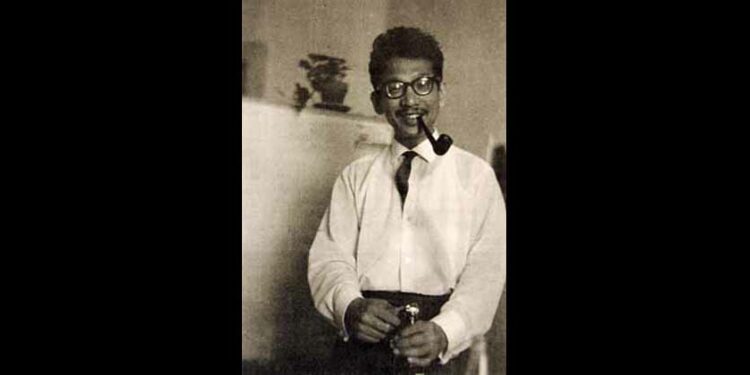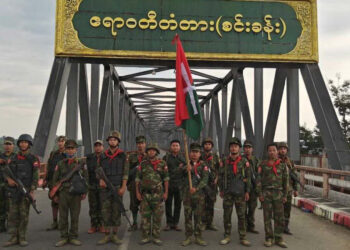As a linguistic scholar and political activist based in Prague in the 1950s and ’60s, Minn Latt Yekhaun called into question existing ideas about the way his native language was taught, while challenging the authoritarian rulers of his homeland. Along the way he established relationships that continue to shape Myanmar-Czech ties to this day. To mark State Counselor Daw Aung San Suu Kyi’s official visit to Prague this week, we revisit this profile of Minn Latt Yekhaun first published in the September 2010 issue of The Irrawaddy magazine.
Minn Latt Yekhaun was one of the first three Burmese students to study in Prague during the 1950s. Despite his tragic death more than 20 years ago, his influence on Burmese-Czech relations remains to this day
In 1966, Burmese intellectual Minn Latt Yekhaun was sitting in Tatran, his favorite Wenceslav Square cafe in Prague, Czechoslovakia, when a convoy passed by escorting Gen Ne Win, the authoritarian ruler of Burma who had taken power four years earlier in a military coup. Minn Latt immediately left the cafe and contacted his friend and colleague, Dr. Dagmar Bečková, and made a dangerous request.
A few days later, during a reception in honor of Ne Win, Bečková and several other friends of Minn Latt approached a member of the general’s entourage and handed him a parcel. Inside the package was a letter addressed to Ne Win that said simply: “Tell the world the truth about Burma.”
Minn Latt knew he was taking a big risk by confronting Ne Win—Burmese studying overseas who became political were normally required to return home, and the junta would certainly not have given Minn Latt a warm welcome back in Burma. Minn Latt could not have known at the time, however, that while his propensity to boldly speak truth to power would ultimately lead to his tragic death, it would not come at the hands of Ne Win, but from guns fired by his own Communist comrades in the jungles of northern Burma.
Minn Latt was a Burmese linguist, historian and writer who studied at the prestigious St. Paul’s Grammar School in Rangoon. Born in 1925, he joined the Burmese resistance against the Japanese during World War II in the Pegu region of Lower Burma. After the war, he became a member of the White Flag faction of the Communist Party of Burma (CPB) and went underground in 1948, shortly after Burma regained its independence from Britain.
When Minn Latt arrived in Prague in 1950, he was one of the first three Burmese students ever to come to the Czech capital. He studied English and history at the Faculty of Philology of Charles University, and his “Burma in English Letters” became an introduction to Burmese studies in Prague.
In 1955, Minn Latt began teaching Burmese at the Prague Language School. He also published “The Prague Method Burmese Reader with Burmese-English and English-Burmese Alphabetical Vocabularies,” which gave Czech students their first chance to study the modern Burmese language. In addition, Minn Latt became a researcher at the Oriental Institute of the Czechoslovak Academy of Science in Prague and a lecturer at the Faculty of Philosophy at Charles University, positions he held until he left Prague in 1967.
Minn Latt’s contribution to Czech-Burmese relations is significant. “His book ‘Burma – the Crossroads of Asia,’ published in Prague in 1958, was the first introduction to the history, politics and economics of Burma for the Czech public,” Bečková wrote in Focus on Burma, a 2008 publication by Burma Center Prague, a non-profit NGO run by Burmese living in the Czech Republic and supporters of Burma.
Minn Latt’s greatest research milestone, according to Bečková, was his book “Modernization of Burmese,” in which he performed a deep analysis of the Burmese language and its modern usage and offered his own proposal for further development of the language. Not only was “Modernization of Burmese” significant in terms of its academic impact, the book also demonstrated once again Minn Latt’s willingness to openly challenge those in power, this time in the form of the academic establishment who resisted the use of anything other than classical Burmese.
In addition to being an academic and activist, Minn Latt was also an active writer whose short stories and poems were published in Burma under the name Yekhaun. And during the period that Minn Latt was in Prague, a young Czech by the name of Václav Havel was also making a name for himself by writing plays that spoke truth to authoritarian power. The two contemporary author activists shared the ability to stand up and risk their lives in opposition to government oppression. Havel went on to lead the 1989 Velvet Revolution—when Communism fell peacefully in Czechoslovakia—and became the country’s first president.
His personal motto was certainly one that Minn Latt would have appreciated: “Truth and love must prevail over lies and hate.”
Despite Minn Latt’s academic accomplishments in Czechoslovakia, his native land remained close to his heart. Minn Latt closely followed political events in Burma, and kept in touch with his CPB comrades who were operating both on the Sino-Burmese border and in the Pegu Yoma mountains in central Burma where the CPB had established its headquarters. By the late 1960s, the CPB also began to penetrate the Wa Hills in northern Burma.

The CPB received military support from Beijing and in 1967, inspired by the Cultural Revolution in China, the Burmese Communists launched their own “semi-cultural revolution” that included purges and gruesome killings of intellectuals, including CPB members’ own relatives. In reaction to the purge, anti-Chinese riots broke out in Rangoon. Diplomatic ties soured between China and Burma and Beijing officially cut aid to Burma and recalled its students. Radio Beijing blasted Ne Win’s government, calling it “fascist, counter-revolutionary and reactionary.”
Also in 1967, the year before the Prague Spring reformists were crushed by the Warsaw Pact invasion, Minn Latt decided to leave Czechoslovakia for China. He arrived in Beijing and remained there until 1969, studying the Shan language. He then went to Shan State, Burma, where he took up residence on the Sino-Burmese border, rejoined his CPB comrades and studied Wa and Shan. According to former CPB members, his work included transcribing Wa into Latin script.
Minn Latt, however, was a man who understood that speaking truth to power does not only mean confronting those one opposes, but also the powerful within one’s own camp. He courted trouble with the CPB by submitting critical reports to politburo leaders, and although the contents of his reports remain unclear, what is known is that they didn’t please party leaders.
In the late 1970s, Minn Latt was detained by the CPB in the northeastern region of Shan State and kept together with Burmese prisoners of war. The scholar spent his time with 15 Burmese soldiers, including an officer, who were captured in battle.
According to former CPB members, when the soldiers planned an escape in [1985], Minn Latt decided to join them. The CPB learned of the break-out, however, and its troops chased down Minn Latt and the Burmese soldiers, opened fire and killed them all. Former Communists are reluctant to talk about Minn Latt’s final episode, and it is not known whether the CPB headquarters gave a shoot-to-kill order or troops acted on their own.
Despite his tragic demise in a remote jungle, Minn Latt’s inspirational and intellectual influence on Burma and its relationship with the current Czech Republic remain to this day.
“Modernization of Burmese,” along with Minn Latt’s other works, “became a great inspiration and support to modern Burmese scholars, writers and journalists in their fight against traditionally conservative scholars who considered the classical Burmese language the only suitable means of expression for writing serious texts,” said Bečková.
She said the younger generation of Burmese authors began to use modern language not only in literature but in other texts as well, demonstrating that the modern method of expression makes the language clearer and more comprehensible. This has carried over until the present, with more and more articles and studies in Burmese newspapers, magazines and books being written in the modern language.
In addition, due certainly in part to Minn Latt’s trailblazing efforts during his time in Prague in the 1950s and 60s, Havel and the current Czech Republic have become prominent supporters of the Burmese opposition and its struggle for democracy and human rights.
In April, the Czech Republic became the third country to back the recommendation made by the UN human rights special rapporteur on Burma, Tomás Ojea Quintana, that the UN Security Council examine setting up a Commission of Inquiry into war crimes and crimes against humanity in Burma.
In a statement sent to The Irrawaddy, the Czech foreign ministry also said that the Czech Republic “remains concerned at continuous grave human rights violations in Burma/Myanmar” and questioned the efficacy of the regime’s “road map to democracy.”
Although this show of Czech support comes more than 40 years after Minn Latt left Czechoslovakia and more than 20 years after his death in the jungles of northern Burma, Minn Latt and the others like him who traveled overseas and demonstrated a willingness to stand up to the successive Burmese regimes were the ones who laid the foundation for future generations of activists and built the bridges that led to support from foreign nations.

Like many Burmese and Czech activists, Minn Latt did not see the results he wanted in his lifetime. But the current democratic state of the Czech Republic is proof that a seemingly hopeless oppression can be reversed if the opposition perseveres. If the Burmese people are one day able to overcome their persecutors the way the Czechs did, then the two countries will share the further bond of two nations that were able to throw off the chains of totalitarian oppression to become free and democratic states. Minn Latt will have been one of the forefathers of that bond, and if he were alive today, he would most likely deliver the same message to junta chief Snr-Gen Than Shwe that he previously delivered to Ne Win: “Tell the world the truth about Burma.”

















